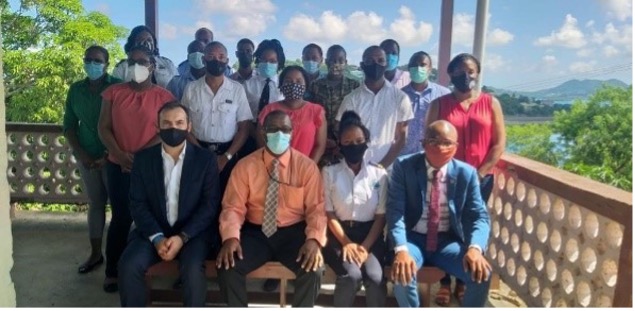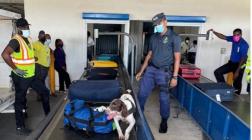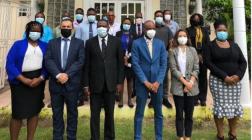
UNODC Global Firearms Programme Training on detection of firearms trafficking and related offences
From 19 to 24 September 2021, as part of the project “Supporting the implementation of the crime prevention and criminal justice component of the Caribbean Firearms Roadmap”, the UNODC Global Firearms Programme (GFP), in cooperation with CARICOM IMPACS, delivered a training on detection of firearms trafficking and related offences via air, maritime borders and using postal and fast parcels. The activity was organised in a hybrid format due to COVID-19 restrictions, and gathered 17 participants in person (8 women) and 29 participants online (11 women) to increase their capacities in detecting and disrupting illicit arms flows. Among participants were agents from competent law enforcement, customs, security forces responsible for border controls and postal services. The four-days training included lectures, practical exercises and sessions of questions and answers. Lecturers included, in addition to GFP and IMPACS staff, experts from UNODC’s Global Cybercrime Programme, EUROPOL, INTERPOL, FRONTEX, Trinidad and Tobago Police Service, St Lucia Police, Spanish National Police, the US Bureau of Alcohol, Tobacco, Firearms and Explosives, the Flemish Peace Institute and Small Arms Survey.
The activity was part of the project “Supporting the implementation of the crime prevention and criminal justice component of the Caribbean Firearms Roadmap”, aimed to prevent and counter illicit manufacturing of and trafficking in firearms and their links to transnational organised crime and other serious crimes, and ultimately to address the scourges of armed violence in the region by:
- Enhanced capacity of criminal justice system to counter illicit proliferation and misuse of firearms in the context of the Caribbean Roadmap and reinforce legislative and regulatory frameworks to comply with international and regional instruments
- Enhanced capacity of criminal justice institutions and border management services to detect, investigate, prosecute, and adjudicate illicit firearms trafficking cases and related offences, and to engage in effective law enforcement and judicial cooperation for that purpose.
- Promote effective international cooperation and sharing of information and good practices among firearms and organised crime practitioners on the prevention and combat of firearms trafficking and related crimes, through regular contacts and use of specialised cooperation networks and platforms.
- Monitoring illicit trafficking flows through enhanced periodic data collection and analysis on firearms and related matters.














